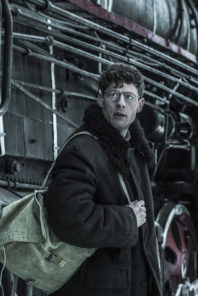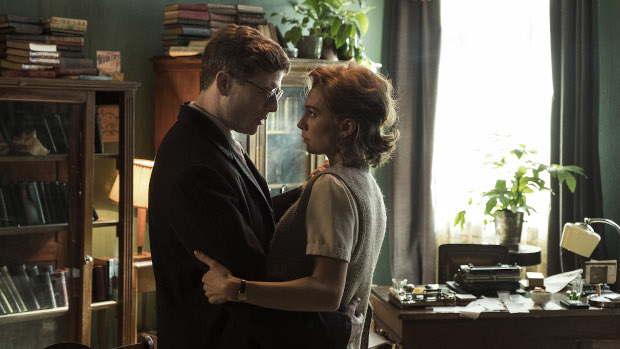
At this point, it would not be an understatement to suggest that Agnieszka Holland has had a prolific career. Holland has been directing feature films since the mid-70s, has worked with Polish greats Krzysztof Zanussi and Andrej Wajda, and even wrote Three Colours: Blue for Kryzsztof Kieślowski. If she wished, she could probably go on autopilot for the remainder of her career, or happily retire having achieved more than most ever do.
Mr. Jones is the prolific auteur’s latest, and it is anything but filmmaking on autopilot. It is clear that Holland continues to choose projects that are meaningful to her. This ultimately shines through in the film, even if it occasionally falls into messy realms. In some senses, the film feels similar to her past works. This, however, marks the first time that Holland has worked with the Holodomor as subject matter, having focused large swaths of her most famous works on the Holocaust.
The titular Mr. Jones is the real-world Gareth Jones (James Norton), a Welsh political journalist who is considered to be one of the first voices to raise concerns about what would eventually come to be known as the Holodomor in the public geopolitical sphere. His outcry would ultimately fall upon deaf ears, with many including rival Walter Duranty (Peter Sarsgaard) dismissing his claims as being exaggerated.
Holland’s work has routinely attempted to consider the ethical dilemmas of individuals caught in difficult situations. One of her most well-known works, Europa Europa, documents a Holocaust survivor who manages to survive by ostensibly hiding in plain sight and posing as a Nazi. Solly, the character in question, faces great troubles simply through his conflating needs of survival and desires. Mr. Jones isn’t exactly the same, but there too is a fascinating dilemma at the heart of it.
Here, however, this dilemma is a quest for the truth in a world that wishes not for it. Pointedly, the film seems to be concerned with portraying an idealized version of journalistic morals. Jones’ quest for the truth manifests itself in his determination for the numbers to simply add up. As he suggests, it makes little sense that the Soviets would be in the midst of an economic upturn during general global economic hardship. It’s in comparison with Sarsgaard’s Duranty that Jones’ virtue is to be found. Simplistically, you could turn Mr. Jones into a tale of good and evil, of courage and cowardice, of the pursuit of the truth against the denial of it.
Part of what makes the film feel like it could be simplistically considering in such a way, is the fact that the film seems to follow the general beats of a cinematic biopic. It’s a pretty obvious statement, but the film is clearly an important issues film; not just in terms of subject matter, but also, in the way that said subject matter can be extrapolated to present day thematic content. There is an obvious parallel to the idea of journalism as propaganda in the present day and age in Mr. Jones, but the thematic statement of the film feels far too polar to properly have weight. Some sources are inevitably more corrupt than others, but the material conditions of journalism in a twenty-first century where social media has devalued the truth for the succinct response, feel far too murky to simply suggest that the quest for an objective truth is a purely noble calling.
Maybe, that’s what Mr. Jones is trying to say, but cannot. Sure, social media has sewn distrust of the media into the minds and hearts of many. But in the early 90s, Jean Baudrillard was willing to claim there was a falsified truth in regards to the American presentation of the gulf war. And on top of that, Gareth Jones attempted to blow the whistle on a façade that attempted to cover-up the starvation of an entire nation of people. The more things change, the more the stay the same…
Holland is at her best when Jones finally makes it to the Ukraine and she’s able to really let her visual skills take over. Cinematographer Tomasz Naumiuk leeches the colour out of the frame, turning the world into a dull trifecta of greys, whites, and blacks. The affect is devastating, a bleak recreation of an atrocity. That, is ultimately the truth Mr. Jones wishes to convey. It’s the truth the actual Gareth Jones strove to provide the world, and was unduly ostracized for his efforts. That alone makes this an important picture. The connective lattices, however, might need to be strengthened just a touch.
- Release Date: 6/19/2020

